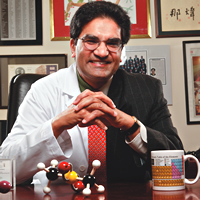| |
 |
| |
Pinstriped
lab coat: Some people wear many hats professionally; here,
Avi Nash (playfully) wears two jackets. The Kellogg alum
has built a successful career that blends his expertise
in chemical engineering and investment banking. Photo
© David Neff |
| |
|
Avi
Nash finds the formula for success
By
Matt Golosinski
Straddling
two worlds — business and science — puts Avi
Nash right where he wants to be: in the heart of the massive
global chemical industry, facing down a multitude of complex
competitive dynamics.
Go to John
Tomaszewski '98
Back to "Part-Time
MBA grads share their leadership experiences"
|



